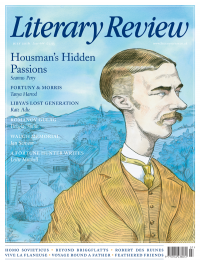Felipe Fernandez-Armesto
Novel Arguments
The Man Who Invented Fiction: How Cervantes Ushered in the Modern World
By William Egginton
Bloomsbury 239pp £25
I did not expect it to be like King Kong vs Godzilla, but I thought the simultaneous Shakespeare and Cervantes quatercentenaries would inspire silly features in which celebrities – Stephen Fry, perhaps, or Penélope Cruz, or the current frontrunner in Britain’s Got Talent – would say which dead white male they preferred. Or surely there would be a debate about the relative merits of Shakespeare and Cervantes involving literature mavens or rival advocates of English and Spanish culture. If nothing else, I hoped the commemorations would provoke new studies of the question of why Shakespeare’s plays and Cervantes’s fiction endure in a world no longer fully equipped to appreciate them – why Don Quixote has outsold every other book save the Bible and Shakespeare is the world’s most often and widely performed playwright.
Though William Egginton mentions the Bard only in passing, he does offer an explanation for Cervantes’s durability: the Spaniard ‘invented fiction’. No one should make this assertion without considering major works of purported fiction from Gilgamesh onwards, including the many stories in the Old Testament, such as those of Ruth and Job, the Iliad and Odyssey and surviving ancient Greek and Hellenistic romances, especially the True History of Lucian of Samosata, which anticipates many features Egginton thinks original to Don Quixote (he does admit in a footnote that ‘Cervantes may have had Lucian in mind’). Equally necessary is knowledge of ancient Chinese stories, Byzantine novels, the numerous storytellers of medieval Europe (including Chaucer), Latin novels of the Renaissance, such as Hypnerotomachia Poliphili (and their vernacular counterparts), and, above all, Japanese fiction of the tenth century onwards, sublimely represented by The Tale of Genji, which reads as if it might have been written yesterday. Egginton, however, takes none of this work into account.
Even more astonishingly, he hardly mentions the many Spanish novels, from La Celestina onwards, that exhibit qualities he claims are unique to Cervantes. He alludes to Lazarillo de Tormes but says nothing about it. He dismisses the picaresque masterpiece Guzmán de Alfarache (which, like Lazarillo, revels in layers of irony

Sign Up to our newsletter
Receive free articles, highlights from the archive, news, details of prizes, and much more.@Lit_Review
Follow Literary Review on Twitter
Twitter Feed
Margaret Atwood has become a cultural weathervane, blamed for predicting dystopia and celebrated for resisting it. Yet her ‘memoir of sorts’ reveals a more complicated, playful figure.
@sophieolive introduces us to a young Peggy.
Sophie Oliver - Ms Fixit’s Characteristics
Sophie Oliver: Ms Fixit’s Characteristics - Book of Lives: A Memoir of Sorts by Margaret Atwood
literaryreview.co.uk
For a writer so ubiquitous, George Orwell remains curiously elusive. His voice is lost, his image scarce; all that survives is the prose, and the interpretations built upon it.
@Dorianlynskey wonders what is to be done.
Dorian Lynskey - Doublethink & Doubt
Dorian Lynskey: Doublethink & Doubt - Orwell: 2+2=5 by Raoul Peck (dir); George Orwell: Life and Legacy by Robert Colls
literaryreview.co.uk
The court of Henry VIII is easy to envision thanks to Hans Holbein the Younger’s portraits: the bearded king, Anne of Cleves in red and gold, Thomas Cromwell demure in black.
Peter Marshall paints a picture of the artist himself.
Peter Marshall - Varnish & Virtue
Peter Marshall: Varnish & Virtue - Holbein: Renaissance Master by Elizabeth Goldring
literaryreview.co.uk